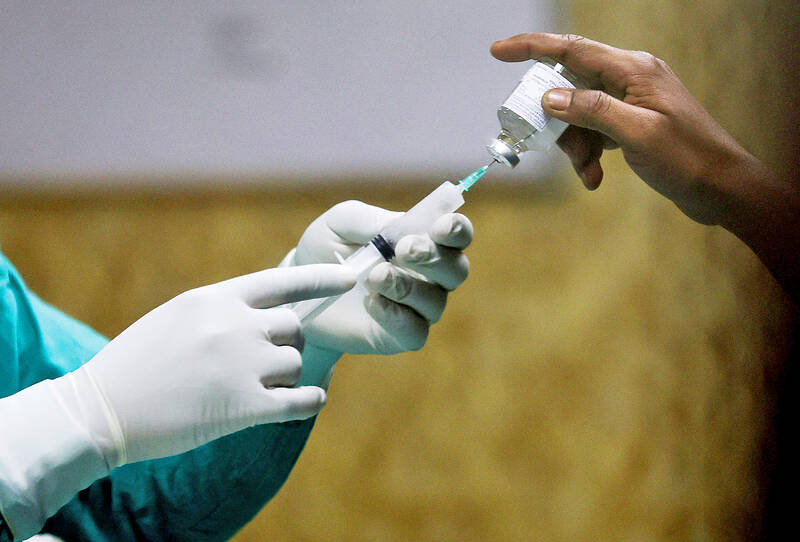A Thai doctor endorsing a dubious diabetes treatment, a Filipino physician touting crotch-enhancing underwear, a US doctor sparking anti-vaccine conspiracies. They are victims of identity theft plaguing health professionals.
Agence France-Presse’s (AFP) fact-checkers exposed a slew of cases around the world in which fraudsters impersonated doctors, fabricating their comments or endorsements to push out bogus treatments and products or to peddle propaganda.
The trend underscores how medical professionals are often sitting targets for online scammers seeking to profit from disinformation, which leaves their reputations tarnished, provokes harassment and, in some cases, legal challenges.

Photo: Reuters
For ordinary consumers, the growing wave of impersonation scams poses financial risks and often jeopardizes access to safe and reliable healthcare.
“I get impersonated [nearly] every month,” Thai neurologist Thiravat Hemachudha said.
“These fraudsters want to make money, so they cite renowned or credible health professionals to support their claims,” Hemachudha said.
Hemachudha’s name has been falsely linked to Facebook ads and posts promoting treatments from diabetes to penile enlargement.
It is unclear who was behind the disinformation, but he said that it poses “significant threats to consumers’ health.”
In the Philippines, Marissa David thought she had found the best cure for a benign lump in her body when she purchased a cream that a Facebook ad said was recommended by popular physician Willie Ong.
However, the cream that cost US$12.50, a small fortune for the Filipino mother, was ineffective and not endorsed by Ong.
“It’s a lesson learned,” David said.
“I should not trust so easily, especially if those products are not recommended by a doctor I personally know,” she said.
Winston Kilimanjaro Creones Tiwaquen, a Filipino doctor who is also a popular social media influencer, has been impersonated on Facebook promoting magnetic underwear, which they falsely claim enlarges male genitalia.
AFP, which has spotted similar impersonation scams in other countries such as Bulgaria and Myanmar, has a global team of journalists who work with Facebook owner Meta’s third-party fact-checking program to debunk misinformation.
AFP has debunked about half a dozen Facebook posts that used doctored videos of Ong or impersonated Tiwaquen, part of a deluge of Internet content in the Philippines that promotes “doctor-recommended” quick-fix treatments for even complicated ailments.
“People often seek quick solutions and can fall prey to scams promising miraculous cures or easy remedies — especially communities that lack access to reliable healthcare services,” Payne Institute fellow Patricia Schouker said.
“Impersonating doctors gives these fraudsters an air of credibility and trustworthiness,” she said.
For doctors such as Natalia Solenkova, a Florida-based critical care specialist, such disinformation led to aggressive online harassment.
Earlier this year, conservative commentators including US podcast host Joe Rogan amplified a screenshot of a fabricated tweet about the COVID-19 vaccine that used her name and Twitter handle.
“Knowing that he [Rogan] has millions and millions of followers, that felt threatening,” Solenkova told the American Medical Association.
“That felt threatening to my career, threatening to my job, threatening to my reputation,” she said.
Rogan acknowledged his mistake, but not before Solenkova was deluged with hateful messages.
“We [physicians] need to keep organizing against disinformation,” Solenkova said.
“We need to stand up to this disinformation and this harassment,” she added.

Packed crowds in India celebrating their cricket team’s victory ended in a deadly stampede on Wednesday, with 11 mainly young fans crushed to death, the local state’s chief minister said. Joyous cricket fans had come out to celebrate and welcome home their heroes, Royal Challengers Bengaluru, after they beat Punjab Kings in a roller-coaster Indian Premier League (IPL) cricket final on Tuesday night. However, the euphoria of the vast crowds in the southern tech city of Bengaluru ended in disaster, with Indian Prime Minister Narendra calling it “absolutely heartrending.” Karnataka Chief Minister Siddaramaiah said most of the deceased are young, with 11 dead

DENIAL: Musk said that the ‘New York Times was lying their ass off,’ after it reported he used so much drugs that he developed bladder problems Elon Musk on Saturday denied a report that he used ketamine and other drugs extensively last year on the US presidential campaign trail. The New York Times on Friday reported that the billionaire adviser to US President Donald Trump used so much ketamine, a powerful anesthetic, that he developed bladder problems. The newspaper said the world’s richest person also took ecstasy and mushrooms, and traveled with a pill box last year, adding that it was not known whether Musk also took drugs while heading the so-called US Department of Government Efficiency (DOGE) after Trump took power in January. In a

LOST CONTACT: The mission carried payloads from Japan, the US and Taiwan’s National Central University, including a deep space radiation probe, ispace said Japanese company ispace said its uncrewed moon lander likely crashed onto the moon’s surface during its lunar touchdown attempt yesterday, marking another failure two years after its unsuccessful inaugural mission. Tokyo-based ispace had hoped to join US firms Intuitive Machines and Firefly Aerospace as companies that have accomplished commercial landings amid a global race for the moon, which includes state-run missions from China and India. A successful mission would have made ispace the first company outside the US to achieve a moon landing. Resilience, ispace’s second lunar lander, could not decelerate fast enough as it approached the moon, and the company has

By 2027, Denmark would relocate its foreign convicts to a prison in Kosovo under a 200-million-euro (US$228.6 million) agreement that has raised concerns among non-governmental organizations (NGOs) and residents, but which could serve as a model for the rest of the EU. The agreement, reached in 2022 and ratified by Kosovar lawmakers last year, provides for the reception of up to 300 foreign prisoners sentenced in Denmark. They must not have been convicted of terrorism or war crimes, or have a mental condition or terminal disease. Once their sentence is completed in Kosovan, they would be deported to their home country. In